Enhanced antiwear performance of EV lubricants with Ti3C2Tx MXene modified by tetradecylphosphonic acid under electrified conditions
IF 6.1
1区 工程技术
Q1 ENGINEERING, MECHANICAL
引用次数: 0
Abstract
The growing demand for electric vehicles (EVs) has underscored the critical need for efficient lubricants capable of addressing the challenges of the electrified interfaces. This research presents the tribological, thermal, and electrochemical corrosion characteristics of multilayered Ti3C2Tx MXene modified by tetradecylphosphonic acid (MXene@TDPA) as antiwear additives. Tribological investigations were performed utilizing an SRV friction tester under the influence of electrification. The results were then compared to those obtained from commercial oil currently used in EVs. The results demonstrate that the lubricant containing the MXene@TDPA additive exhibits superior anti-corrosion characteristics compared to the commercial oil. Notably, the results demonstrate that the MXene@TDPA additive achieves a significant improvement in antiwear properties of up to 77 % at 6 A and 100 °C. Furthermore, the MXene@TDPA additive maintains its lubrication performance across a wide temperature range up to 300 °C without seizure. This work highlights the potential of MXene-based additives to decrease the failure rate of mechanical components in EVs.
求助全文
约1分钟内获得全文
求助全文
来源期刊

Tribology International
工程技术-工程:机械
CiteScore
10.10
自引率
16.10%
发文量
627
审稿时长
35 days
期刊介绍:
Tribology is the science of rubbing surfaces and contributes to every facet of our everyday life, from live cell friction to engine lubrication and seismology. As such tribology is truly multidisciplinary and this extraordinary breadth of scientific interest is reflected in the scope of Tribology International.
Tribology International seeks to publish original research papers of the highest scientific quality to provide an archival resource for scientists from all backgrounds. Written contributions are invited reporting experimental and modelling studies both in established areas of tribology and emerging fields. Scientific topics include the physics or chemistry of tribo-surfaces, bio-tribology, surface engineering and materials, contact mechanics, nano-tribology, lubricants and hydrodynamic lubrication.
 求助内容:
求助内容: 应助结果提醒方式:
应助结果提醒方式:


